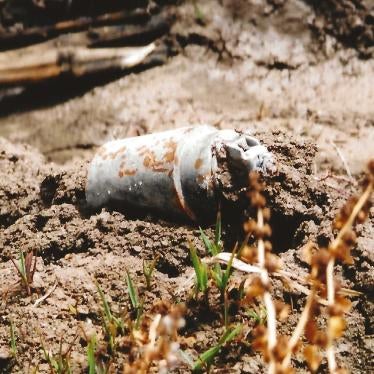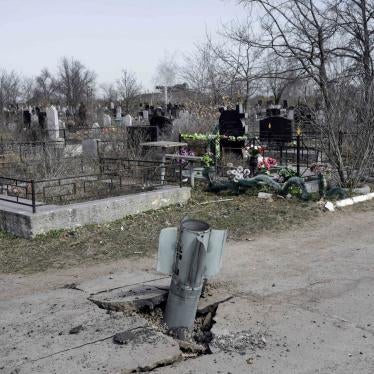Thank you Mr. Foreign Minister [of the Netherlands] for inviting me to this briefing, thank you Eugénia [Piza-Lopez of International Alert, who chaired the briefing]. Ladies and gentlemen.
Most of you, I am sure, have come across the horrors of small arms proliferation and misuse. In disaster after disaster, from Rwanda to East Timor, you have reported, as we have, indiscriminate attacks against civilians, and about entire communities destroyed and terrorized at gun-point. I should say small gun-point because, as you know, small arms and light weapons are the instruments most frequently brandished to commit abuses around the world.
When you buy a chicken, this transaction carries no consequence: you pay the money, you get the bird. In some parts of Africa, however, a chicken may be bartered for an assault rifle. In this transaction, chances are that someone ultimately will suffer. Usually this someone is not a party to the trade, as survivors of conflict in Sierra Leone, for example, or the hundreds of thousands of refugees from Sudan and Angola would tell you.
Yet small arms and light weapons have been for too long the Cinderella of debates on how to curb weapons proliferation and the abuses it engenders.
Nongovernmental organizations around the world came to recognize the perils of this omission. To address this, we have formed the International Action Network on Small Arms (IANSA). IANSA's aim is to curb the proliferation, availability, and misuse of small arms. The complexity of this problem has brought together a variety of NGOs. In IANSA you will find participants from the North and the South, from the human rights to the humanitarian relief communities; from development to victims assistance organizations; from domestic gun control to conflict prevention groups. At the moment, there are 200 of us. Keep counting because we started only a year ago.
Our network may be young, but each of us has a wealth of experience to offer. Some of us have documented the abuses facilitated by small arms, some others have been active in weapons destruction programs, others yet have been engaged in peacebuilding programs and in public health delivery. This is because small arms have affected all these aspects of people's lives. We know that the task ahead of us is daunting. But we believe that IANSA is part of the answer.
The other part is the role played by governments and international organizations such as the U.N. IANSA members have engaged individual governments and legislators because governments are ultimately responsible for the arms they transfer themselves or that are traded commercially. They are responsible for putting in place controls that would preclude abusers around the world from receiving weapons. They are responsible for the security of their stockpiles. They are responsible for the actions of their nationals. They are responsible for what transits through their territories.
The victims and the NGO community have been advocating for years the exercise of such responsibility and will continue to do so. They have not been alone: a U.N. panel of experts on small arms has also exhorted U.N. member states to exercise restraint in small arms transfers. Yet the members of the U.N. security council are still responsible for 85% of arms exports in the world many of which go to human rights abusers. The same panel has noted in a recent report, for example, that the U.N. collectively has been affected by the consequences of the widespread misuse of small arms in all aspects of its work.
The Security Council debate tomorrow will offer an excellent opportunity to test the political will of the world's most important body to address the scourge of small arms abuse. The Presidency of the Netherlands has lined up a number of important issues for the Security Council's consideration. These issues need to be debated yes, but scream for action.
Implementation of arms embargoes is one of them. U.N. member states have often supplied weapons to human rights abusers in defiance of the security council's will. This has happened virtually every time a U.N. arms ban has entered into force. When caught on the scene and exposed, these member states knew that their actions would go unpunished anyway. If the communal U.N. will were to be respected, surely mechanisms to implement and enforce arms embargoes must be put in place.
States have also often acted by proxy and allowed the mushrooming of private actors—brokers, transportation agents, and the like—who are only too eager to carry out covert deals on behalf of government patrons and reap handsome profits in the process. Some of the graduates of the covert trade have continued to keep their pipelines running for subsequent conflicts. These shadowy characters, too, have basked in impunity. Currently there are very few governments that regulate the activities of these middlemen. As the illegal arms trade, too, has gone global, governments should wake up to this reality and make sure that those who deal with human rights abusers in violation of national arms trade controls and embargoes are exposed, tracked across national borders, and punished.
The Dutch Presidency of the Security Council has reminded us that programs for the disarmament and reintegration of former combatants should be another priority for the Security Council. We could not agree more because this is an important way of preventing the recirculation of weapons and future abuse. We hope that wealthy council members will be willing to put their money and expertise where their mouth is. We also hope that this commitment will be sustained. It is when the spotlight turns away from a conflict and donor fatigue sets in, that we see the emergence of roaming armed bands of ex-combatants terrorizing civilians.
Finally, the Security Council will debate tomorrow what should be done at the U.N. conference on the illicit arms trade in all its aspects that will be held in the year 2001. This may be a momentous event for the new millennium or may turn out to be yet another well-intended but inconsequential exercise in rhetoric. To avoid the latter outcome, I have a suggestion: the Security Council should take the lead in making sure that the conference will give the participants the go ahead to negotiate agreements that will bind governments to act responsibly in their arms transfers. Such agreements would give notice to human rights abusers that the arms pipelines are drying up.
We have no illusion that the trade in small arms can be drastically reduced fast. But we must also remember that forces engaged in armed conflict do not just receive military support when they receive weapons. They also receive a signal that whatever they are doing is okay and that the international community is closing an eye to their abuses.
Thank you.






